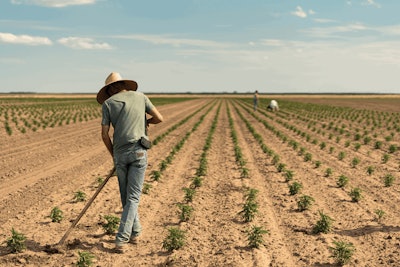
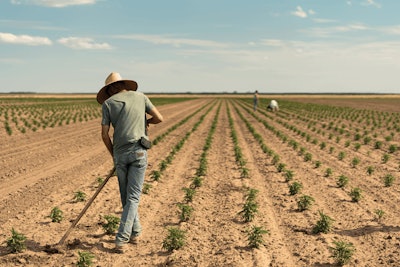
It is indisputable that 2020 has been a year of change. And with change often comes two choices: Dig your heels in and resist, or adapt.
Less than a year after Deanie Elsner was hired as CEO of Charlotte’s Web Inc. (CW) in May 2019, change crashed in like a wave. The coronavirus pandemic spread to the U.S. in early 2020, followed by store closures across the country that forced a majority of retail sales to move online.
Then, on April 7, the company’s namesake, Charlotte Figi, passed away at age 13. Despite testing negative for the virus just days earlier, she was treated as a likely COVID-19 case, wrote Charlotte’s mom, Paige Figi, in a Facebook post.
“The news of Charlotte’s passing has been devastating to our organization,” Elsner said at the time, adding to CW co-founder and board member Joel Stanley’s statement that Charlotte was CW's “original founder” and “northern star.”
Faced with these adversities, Elsner has chosen to adapt by balancing the company’s original mission to “improve life, naturally” with new initiatives and ideas to drive growth.
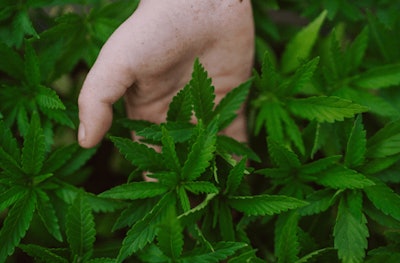
CW, a pioneer of sorts in the CBD industry, has faced its own share of change throughout its history. Around the time Paige Figi first sought out the Stanley Brothers (a company founded by Stanley and his six brothers, who had not yet launched CW) for their CBD Original Formula to ease Charlotte’s grand mal seizures in 2012, the company had a modest waitlist of 40 people. When Charlotte and the brothers made a debut on CNN’s “Weed” series in 2013, that waitlist skyrocketed to 15,000 people.
In the time since, the Stanley brothers have not only launched the vertically integrated CW, but also turned it into the largest CBD brand by market share in the U.S., selling products in nearly 21,000 retail locations across the country.
Now, Elsner is looking to carry that momentum through a global pandemic and expand the company internationally in 2021 and beyond.
CPG to CBD
Elsner was no stranger to change, either, when she took the helm of the Boulder, Colo.-based CW. She came to the company with an extensive leadership background, particularly in helping consumer packaged goods (CPG) businesses change their financial trajectories.
Elsner was previously the president of Kellogg’s Snack Business Unit, where she led more than 1,000 employees and eight plants that manufacture brands like Pringles, Keebler and Cheez-It. At Kellogg’s, she raised profits by nearly 10% and evolved the company's supply chain and marketing strategy.
Prior to that, she served more than 20 years in various leadership roles at Kraft Foods, where she used data to deploy innovative marketing strategies that led to a boom in sales for brands across the business. For example, under Elsner’s leadership, Lunchables began marketing to adults, which resulted in a double-digit increase in gross sales for the brand. (Elsner was ranked on Forbes’ "Top 50 Most Influential Chief Marketing Officers" list in 2014.)
Elsner has also taken on international roles, serving as the president of Kraft’s coffee business in Europe, where she expanded business capabilities, designed a portfolio strategy and launched new products across 18 countries.
While Elsner says her background seems like “the antithesis” of what one might expect from the CEO of a CBD corporation, she had been yearning to pursue a more dynamic and disruptive career role.
“I kept thinking, ‘Am I the person who wants to go out of my career having marketed Cheez-Its, or am I the person who wants to exit my career having democratized something wonderfully natural like this botanic to the world?’” Elsner says. “It was a pretty easy answer for me.”
At the time of Elsner’s hiring, company executives had been building out the CW leadership team to lead the company's growth as a “dominant global CPG brand,” according to a news release.
“Deanie’s appointment is timely and aligns perfectly with our corporate evolution. … Placing world-class marketing and sales expertise at the highest level of the company is critical to further extend Charlotte’s Web’s leadership position in the market,” said Hess Moallem, former president and CEO of the company, in the news release. (Once Elsner became CEO, Moallem transitioned to an advisory role with CW.)

"I kept thinking, ‘Am I the person who wants to go out of my career having marketed Cheez-Its, or am I the person who wants to exit my career having democratized something wonderfully natural like this botanic to the world?’ It was a pretty easy answer for me.” - Deanie Elsner, CEO, Charlotte’s Web
Bringing Experience to a New Industry
Since arriving at CW, Elsner has been building on her past experiences by continuing to build out the company’s leadership team and using data to drive decisions.
The latter pursuit posed a challenge for Elsner because the fresh-faced CBD industry didn’t have much data to work from. So, Elsner got to work piecemealing numbers from outside sources as well as from CW’s own reservoir.
“E-commerce was a channel of business for us, but we’ve moved that channel of business to be our data nucleus for the company,” Elsner says.

"The brothers, we knew what we needed, but we didn’t know how to get there. And so we’ve surrounded the company with just incredible ability, talent and leadership….” - Jared Stanley, co-founder, Charlotte’s Web
By assembling a mass of data points, Elsner says CW has been able to “get smarter about what consumers need."
“We’ve built an ecosystem, if you will, and it literally feeds on itself,” Elsner says. “If you’ve got good data, then you can get to good content in terms of what you provide consumers. If you have good content, you have good experiences that make consumers engage with you. If you’ve got good experiences, they’re going to … purchase your product.”
Elsner has helped complete numerous other initiatives since she joined CW. In March, the company announced its plans to acquire Abacus Health Products Inc., which filled in two major gaps for the company—its distribution to healthcare practitioners and its topical CBD offerings. The acquisition was completed in September.
“We were hell-bent on getting this acquisition integrated as quickly as possible so that we could move on with our business,” Elsner says. “You will see us begin to make major inroads into that business in Q4 [of 2020] and Q1 of next year.”
In 2020, the company also became a Certified B Corporation, which requires businesses to meet rigorous standards of social and environmental performance, transparency and “legal accountability to balance profit and purpose,” according to the B Corps website—all of which Elsner says aligns well with the company’s mission. (Only about 3,500 companies have received certification out of over 60,000 that have taken the B Corp assessment, according to a CW news release.)
CW also opened a 130,000-square-foot production facility and R&D lab in Louisville, Colo., this year, as well as CW Labs in Buffalo, N.Y., which will expand the company’s work on CBD, terpenes, flavonoid compounds and other minor cannabinoids.
How It All Began
As Elsner navigates the company’s business operations, one of the company’s seven founding brothers, Jared Stanley, still remains engaged with growing hemp in his role as CW's chief cultivation officer.
Jared Stanley began cultivating hemp after his oldest brother, Josh Stanley, opened one of Denver’s earliest medical marijuana dispensaries in 2008, just as the economy began to collapse. At that time, Joel, Jesse, Jordan and Jon Stanley were looking for jobs, and Jared Stanley, who was a student then, couldn't find an internship.
Shortly after, the brothers’ cousin was diagnosed with stage 4 cancer.
So, all seven brothers banded together in 2009 under the state’s medical marijuana caregiver program in pursuit of a cannabis formula that might benefit their cousin. Jared Stanley says the brothers went more than $4,000 into debt creating that initial formula.
From that pursuit, the brothers set out on a mission to help heal others with natural botanicals. “For the first couple years, we didn’t have a single employee because the brothers had different skill sets that were driving the focus of the company,” Jared Stanley says.
The Stanley brothers began to meet other patients with cancer, who used cannabis to relieve their symptoms but didn’t like the intoxicating effects, Jared Stanley says.
“It was really that feedback that drove us to breed for THC [tetrahydrocannabinol] down and go back to the naturally occurring CBD in the plant that we had lost. … That really started the Charlotte’s Web phenomenon,” he says.
Back in those days, the brothers did quite literally turn to nature. They began scouring the state for feral hemp—which often contains low THC content—and breeding it with the high-THC genetics they had been working with. That variety went into CW's flagship CBD formulation that is still sold today.
“I think the work that was done in those early years was really beautiful and magical. These were individuals who didn’t have any formal training in this, and they let the plant speak to them and guide them to the right path,” says Bear Reel, the company’s senior director of cultivation research and development. “What I do is a little bit more structured, but I think there’s still that listening to plants … that is paramount to being successful in finding those gems.”
Reel has been honing the company’s genetics since 2014 by producing thousands of crossings, integrating new varieties into CW’s genetics collection and adapting them to produce consistent results across the small family farms in Colorado, Oregon and Kentucky that the company has partnered with. (CW covers all production costs up front for its partners, and the farmers repay the costs and receive a bonus based on their crop's value after harvest. The seeds and plant never leave CW's ownership.) The CW cultivation team operates the Colorado farms, while those in Kentucky and Oregon are run by contracted farmers.
Consistency is key to CW’s strategy, especially because its hemp is grown in different regions of the U.S. It’s part of the reason, Jared Stanley says, that the company has now received patents for two of its varieties. The first patent for an asexually reproduced variety called CW2A was approved in July 2019. The second patent, approved in May 2020, is a utility patent for a variety called CW1AS1, which features the same phytochemical profiles as the company’s Original Formula. The utility patent assures consistency, but it also provides an added layer of intellectual property protection beyond that of a plant patent. (Editor’s note: Plant patents address any distinct and new variety of plant that is not found in nature and reproduced asexually. Utility patents address “any new useful process, machine, manufacture or composition of matter,” according to Cornell Law School’s Legal Information Institute.)
“For us, it was so important to protect those varieties for the people who needed them,” Reel says. “We had to make that call that, if we put our flag in the sand, it would guarantee that our customers will always have this product to rely on.”
Those strains, among others that Reel finds have the best phytochemical properties, eventually make their way out to the fields for production.
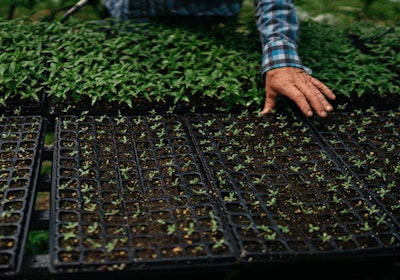
Cultivation Consistency
Organic cultivation practices are another priority for CW. As of late 2020, 90% of CW’s total farm acreage was USDA Certified Organic, and the company intends to reach 100% certified by 2021.
Reel says organic certification was a natural progression, as CW never used synthetic pesticides nor herbicides to grow. Instead, the company introduced natural soil amendments, such as local chicken manure, to its soil, and implemented a three-year crop rotation, which varies from farm to farm. Some farms rotate hemp with horseradish, for example, because of its large root system that can break up hard soils and generate oxygen flow.
Many farmers growing for CW also use companion cropping to divert hemp pests to other crops the insects prefer.
“What we see in our hemp fields is that a lot of diversity is coming back,” Reel says. “A lot of predator insects and insects that will protect our plants from the ones that want a munch on it come naturally … [creating] a more natural, beautiful ecosystem in our fields.”
To maintain consistency as well as quality, Jared Stanley says CW has automated nearly every aspect of the cultivation process, from planting with GPS-driven (self-guided) tractors to mechanizing post-harvest processing.
“From the time that we drive through the field to the time that [the hemp is] in a bin, the only hands that are actually touching it are controlling the systems to ensure that it’s quality and check certain checkpoints,” Jared Stanley says. “This has allowed us to scale with a higher level of quality.”
Jared Stanley adds that CW performs 20 different quality assurance tests on materials throughout cultivation and processing, from testing soils and irrigation water for contaminants to testing for molds and harmful bacteria after extraction. (CW uses two types of extraction, depending on the product: alcohol or CO2.)
Navigating Uncertainty
By building out its leadership team and maintaining consistency despite rapid growth, CW has found success in the ever-changing CBD market. But even CW hasn’t been spared the challenges plaguing thousands of other businesses in the industry.
While CW did see a boost in online sales because of store closures from the coronavirus pandemic, the company reported a net loss of $14.4 million in Q2 of 2020, as compared with a net income of $2.2 million the same time the year prior.
Despite the steep loss, Elsner anticipates the worst of the pandemic is behind the U.S. And, with a product line expansion across channels and a larger distribution network than 2019, she expects CW sales will be on the rebound heading into 2021.
Elsner is also trying to prepare for the future by coordinating with the U.S. Food and Drug Administration (FDA) on moving CBD regulations forward, which has been a major holdup for not just CW, but the entire industry. CW is part of a national multi-company study into how CBD affects the liver with long-term use. But Elsner says the company is also providing the FDA with its own data that engulfs everything from seed to production, including data on its cultivation practices, its genetics, its testing protocols and more.
Elsner says she hopes the data CW is providing will help set the standards for incoming industry regulations. While she believes it will benefit the entire industry, Elsner acknowledges it gives CW an additional edge.
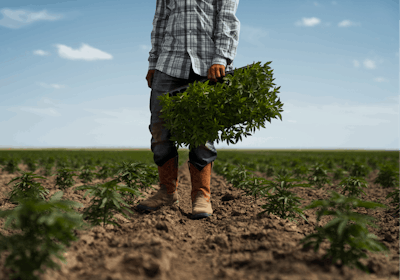
“The bet I’m making is that when it opens up, we will disproportionately benefit. But those are the kinds of things we’re doing—we’re educating, we’re helping influence, we’re participating as a category leader,” Elsner says. “We would love to see a high level of standards set for this category. We think the category deserves it and the consumers deserve it.”
Elsner says the lack of FDA regulations has, in part, contributed to more litigation. CW has been subject of several class-action lawsuits between 2019 and 2020 that allege the company mislabeled its products. The latest case, Moqeet v. Charlotte’s Web, Inc., is still moving through a California district court.
“Where you’ve got high growth and a lot of competition and uncertainty, people are going to look to take advantage,” Elsner says. “We are tackling any of these class actions aggressively, because we think we’re in the right.”
Looking to the Future
Despite headwinds, CW persists. Elsner says the company will be launching new products in the first half of next year that will be highly targeted to different consumer demographics. Elsner is also looking to expand the company next year into overseas markets that have established CBD regulatory environments, including in Canada and Europe. “International expansion is a mandatory part of our strategy,” Elsner says. “It’s important for us to have our products where consumers are.” (Currently, CW's products are only available in Canada through the company's website if the consumer has a Health Canada exemption.)
Elsner says the Stanley brothers never intended CW to be a large commercial business. Yet, even as the company continues to grow and navigate immense changes since its founding, Jared Stanley says that in some ways, the business remains the same.
“The brothers, we knew what we needed, but we didn’t know how to get there. And so we’ve surrounded the company with just incredible ability, talent and leadership, but it’s holding to the same mission, vision and values,” Jared Stanley says. “It’s actually quite remarkable.”
Theresa Bennett is an associate editor for Hemp Grower.














